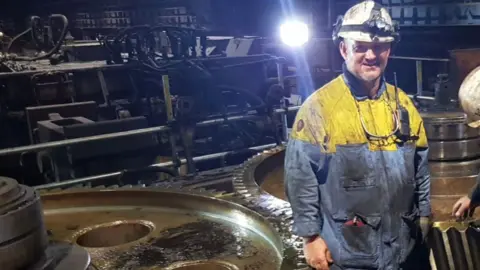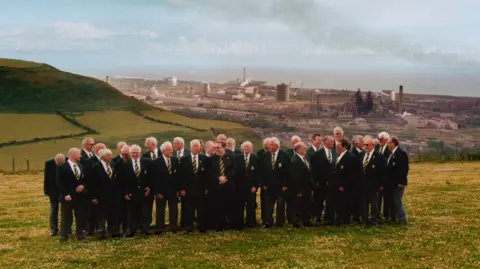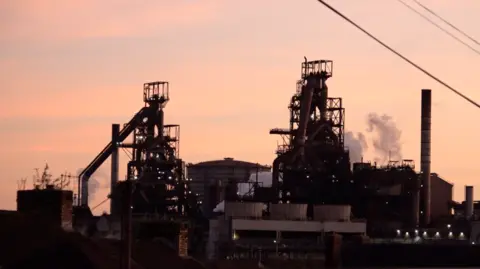
 Steven Partridge
Steven Partridge
When Steven Partridge retired in 2021, he was still working alongside six others who started their apprenticeships on the same day more than forty years ago
Thousands of families have depended on Port Talbot's steelworks to provide local jobs for more than a hundred years.
At the end of the month, the second of its two blast furnaces will shut down and around two thousand jobs will be lost.
"Steel town - it's in our DNA," said former Port Talbot steelworker Steven Partridge.
The 60-year-old missed family birthdays and wedding anniversaries because of shift patterns and overtime at the plant.
He said the pressure to ensure there were no accidents whilst making high quality steel was "immense".
"You see taxis called steel town. Cafes, shops - steel town. We live and breathe steel," said Steven, who retired in 2021.
Most of the town's only male voice choir - Cymric Choir - have had decades of employment at the Abbey Works, which was acquired by Tata Steel in 2007.
During a recent weekly rehearsal in a hall behind Taibach Methodist Church, some of the group's members shared fond memories of their time at the works.

 Roo Lewis
Roo Lewis
A photo of the Cymric Choir standing on a hill overlooking Port Talbot
Steve Williams, 72, is one of six generations in his family to have worked at the steel plant. His daughter and grandson are still there.
"My first encounter with the steelworks was when I was seven years old. My mother was from Merthyr and there was a tragedy, so she had to go back pretty sharp. My father was afternoons, so there was nobody to mind me," he recalled.
"My father took me into the works on his moped and I was sitting on his traction crane whilst he was working and then at the end of the day then we went back to the canteen and had a game of cards."
Among the many sounds and smells of the steelworks, Steve's most notable memory is the smell of "rotten eggs", which comes from the slag that's formed during the steel-making process.
"I always remember the smell. My father used to smash up the slag from the torpedoes and he had to break it up with his crane. That smell has lived with me for the rest of my my life."


Steve Williams said whether you were in the pub or walking down the street, the conversation would often be about life in the steelworks
In its heyday during the 1960s, more than 18,000 people were employed at Port Talbot's steelworks.
But the site has gone through many periods of change, which has sometimes resulted in strikes and job cuts.
"In my first years after my apprenticeship I was locked out of work for 26 weeks with two young children and no pay, so yeah, I’ve seen a lot of different times," said Steve.
"We scrimped and saved. My wife had to go out and find a part time job. I had a young baby and daughter and milk tokens was the only thing I was entitled to."


Port Talbot's Cymric choir was established in 1911 and the majority of its members are either former or current steelworkers
Peter Sharp's father came from Scotland to find work in Port Talbot.
The 67-year-old lives on the Sandfields estate, which was built initially to house some of the town's steelworkers during the 1940s and 50s.
"I worked in the pick line. It’s where they run the steel coils through the acid baths," Peter said.
"The job was tough, dirty, noisy but the camaraderie there was brilliant."
Peter's son was the third generation of the Sharp family to enter the steelworks, but he left earlier this year after it was announced that the furnaces would close.
"It breaks my heart. Port Talbot won’t feel or look the same. Maybe one day in the future we’ll be glad to see it move on but not right now," he said.
"It’s integrated right throughout the community. I was a big rugby player and all steelworkers played and even though we were in different teams, we were all friendly. It’s the centre - the heartbeat of the town, really."
The choir's pianist Angharad Young, 46, is a teacher at a local primary school.
As well as a connection to the steelworks through her grandfather, she said a number of her pupils also have parents who are employed at Tata Steel.


Later this month, virgin steelmaking at the town's Abbey Works will end after more than 70 years
What's happening at the steelworks is of "great concern" to her, especially in a town which has high levels of deprivation.
"You see it, you hear it, you smell it sometimes too. Port Talbot wouldn't be here if it wasn't for the works," Angharad said.
She said there was also an understanding about the impact the current steel-making process has on the environment.
"I know it's not always been the cleanest of places but I think it's improved over the years," she said.
"We're proud of it. The children are proud to be able to say someone in their family works there."

 2 hours ago
1
2 hours ago
1















 English (US) ·
English (US) ·